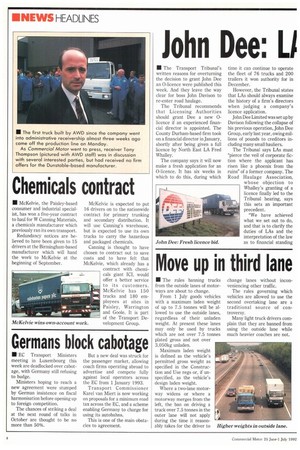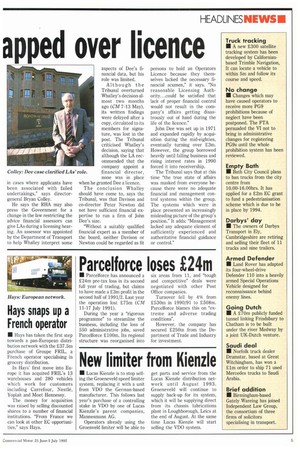John Dee: Li apped over licence
Page 8

Page 9

If you've noticed an error in this article please click here to report it so we can fix it.
• The Transport Tribunal's written reasons for overturning the decision to grant John Dee an 0-licence were published this week. And they leave the way clear for boss John Davison to re-enter road haulage.
The Tribunal recommends that Licensing Authorities should grant Dee a new 0licence if an experienced financial director is appointed. The County Durham-based firm took on a financial director in January, shortly after being given a full licence by North East LA Fred Whalley.
The company says it will now make a fresh application for an 0-licence. It has six weeks in which to do this, during which time it can continue to operate the fleet of 76 trucks and 200 trailers it won authority for in December.
However, the Tribunal states that LAs should always examine the history of a firm's directors when judging a company's licence application.
John Dee Limited was set up by Davison following the collapse of his previous operation, John Dee Group, early last year, owing millions of pounds to creditors including many small hauliers.
The Tribunal says LAs must "pierce the veil of corporate fiction where the applicant has risen like a phoenix from the ruins" of a former company. The Road Haulage Association, whose objection to Whalley's granting of a licence finally led to the Tribunal hearing, says this sets an important precedent.
"We have achieved what we set out to do, and that is to clarify the duties of LAs and the interpretation of the law as to financial standing in cases where applicants have been associated with failed undertakings," says directorgeneral Bryan Colley.
He says the RHA may also press the Government for a change in the law restricting the advice financial assessors can give LAs during a licensing hearing. An assessor was appointed by the Department of Transport to help Whalley interpret some aspects of Dee's financial data, but his role was limited.
Although the Tribunal overturned Whalley's decision almost two months ago (CM 7-13 May), its written findings were delayed after a copy, circulated to its members for signature, was lost in the post. The Tribunal criticised Whalley's decision, saying that although the LA recommended that the company appoint a financial director, none was in place when he granted Dee a licence.
The conclusion Whalley should have come to, says the Tribunal, was that Davison and co-director Peter Newton did not have sufficient financial expertise to run a firm of John Dee's size, 'Vithout a suitably qualified financial expert as a member of the board, neither Davison or Newton could be regarded as fit persons to hold an Operators Licence because they themselves lacked the necessary financial acumen," it says. "No reasonable Licensing Authority...could be satisfied that lack of proper financial control would not result in the company's affairs getting disastrously out of hand during the life of the licence."
John Dee was set up in 1971 and expanded rapidly by acquisition during the mid-eighties, eventually turning over £3m. However, the group borrowed heavily until falling business and rising interest rates in 1990 forced it into receivership.
The Tribunal says that at this time "the true state of affairs was masked from everyone because there were no adequate financial and management control systems within the group. The systems which were in place presented an increasingly misleading picture of the group's position." It adds: "Management lacked any adequate element of sufficiently experienced and authoritative financial guidance or control."














































































